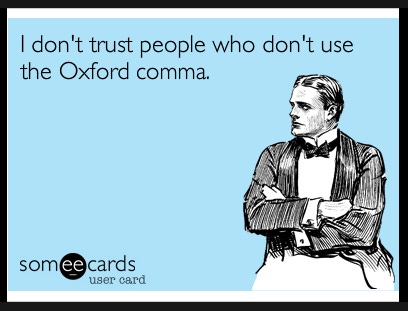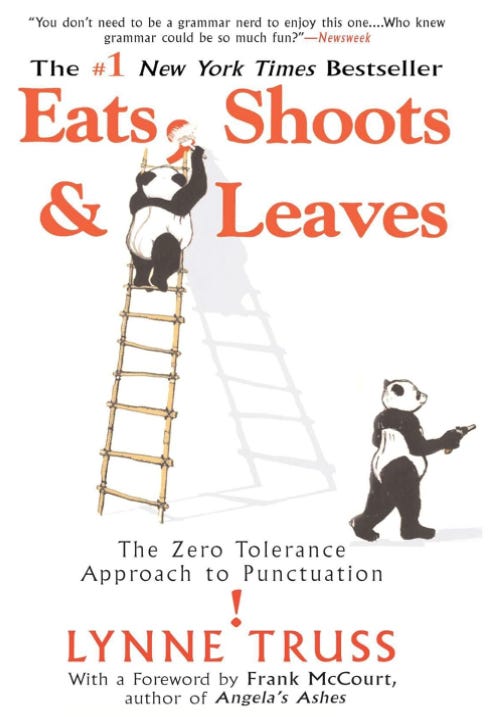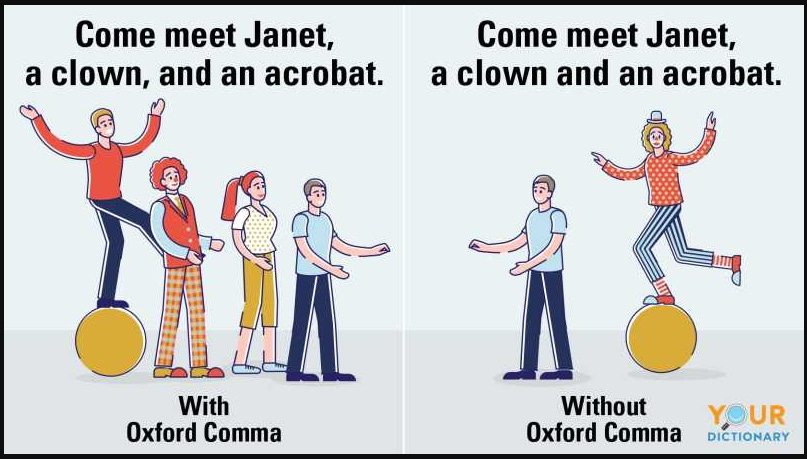First, a big thanks to everyone who recently subscribed! Thanks for being here and thanks for coming back. You have my eternal gratitude.
But onto serious matters. I have been having an illicit love affair that has been getting harder to hide. Yes, my friends, it is time to come clean: I have a love affair with the Oxford comma.
Maybe it’s because I used to do hours upon hours of live instruction and appreciated the spaces where I could pause and take a breath. Maybe it’s because I’m over dramatic, and still think I could make it as a stage actor, and want to pause for dramatic effect. Maybe it’s because I was taught to use them in lists, for subordinate clauses, and whenever FANBOYS showed up.1Maybe it’s because I just like commas and think they add so much to life.
It has been within the past year that I have noticed the professional disdain for the Oxford Comma. Most of my clients hate the Oxford comma. Hate with a capital H. Usually the first feedback I get on editing or copyediting work is, ‘Oh, we don’t use the Oxford comma.’
And I sit back, close my eyes, and think to myself, So this is how this is going to go.
I want to make clear: I’m not an idiot. If you’re paying me and tell me to not use the Oxford Comma, I won’t. I have many hills to die on, but this is not one of them. I do, however, reserve the right to silently judge you and think your opinion is wrong.
After I recently accepted a tutoring position, my new boss and I spent 5 minutes talking about the citation style their center uses, which devolved into a conversation about the Oxford comma, and how we don’t get why people despise it.
So let’s review. What is the Oxford Comma? Why am I obsessed with it?
First of all, the Oxford Comma is a comma.2 Per Oxford Languages, it’s “a comma used after the penultimate item in a list of three or more items, before ‘and’ or ‘or’.”3 This is in line with how I was taught to use commas - anytime there’s a conjunction, which includes and (and) or.
To aid in my quest of understanding why the Oxford Comma has lost its potency, I turned to an omnipotent source: the pop psychology/grammar book Eats, Shoots & Leaves.
Do I have 8 other books on my TBR that I’m reading right now? Yup. Do I care? Nope.
Eats, Shoots & Leaves was very popular around the time that I was in middle school. Think early 2000s. It was the type of book you read to show that you were serious and cool and above the hoi-polloi. I was fervently against such silly things, which was my own way of being counter cultural. So I never read it. But now seems like a good time as any to support my own confirmation bias.
I take after one of my MFA professors, Ann Hood. When asked what she thought about adverbs, that oft maligned part of speech, she had the following to say: “Adverbs are a part of speech. We shouldn’t be throwing out entire parts of speech.”
Her larger point is that any part of grammar used incorrectly can be ridiculous, and I agree. I would argue this principle applies to the Oxford Comma as well.
Commas are important! We should not just throw them away! Can they be used exuberantly? Of course! Look at any 19th century novel. But that’s not how we use them today, so what gives?
One of my clients has flat out said that if I find myself in a place where I’m adding a comma, I should just start a new sentence. This befuddles me to no end, because what about lists?? What about conjunctions?? These are PERFECTLY REASONABLE cases to use a comma! We’re not even talking about the Oxford comma here! Just a regular comma!!
I had to see if this pop grammar book of days of yore agreed with me. And…it did? Kind of?
I was fully prepared to dislike this book. I was reading a digital copy from my library and mine was 96 pages. A solid 27 of those were: praise for the book, a new preface talking about why the book was good, the regular preface, and then an intro. If you are giving me over a third of a book talking about how good your book is, then I’m going to need the remaining 70% to be solid gold.
The remaining 70% was not solid gold, but it was fine. I actually found the explanations of how different punctuation marks were used to be the most helpful, and I think I would have enjoyed the book better if it was more grammar handbook and less screed against modern society.4 Honestly? This would have been more helpful to me 20 years ago, because I did *not* get a good grammar education in primary school. It wasn’t until high school that I was put through a rigorous grammar course.5
Bur surprisingly little time was spent on why the Oxford comma is maligned, and it mainly comes down to: preference and style. So, if you’re a journalist or using AP style, you’re going to hate the Oxford Comma. I was looking for a blood feud. This was a let down.
I’m not a pedant about the oxford comma, thankfully. I will respect your right to not use it. I will just silently judge you and think you’re wrong. I am a pedant about the misused parallelism often found in the not only…but also construction, so if you misuse that, I WILL point it out. Fair warning to all.
The conjunctions For, And, Nor, But, Or, Yet and So.
Thank you, thank you, I’ll be here all week.
https://www.google.com/search?q=oxford+comma+definition&oq=oxford+comma+definition&aqs=chrome..69i57j0i22i30j0i15i22i30j0i22i30l5j0i10i22i30j0i15i22i30.3245j1j7&sourceid=chrome&ie=UTF-8
Would you look at that! A footnote actually doing its job!
Lynne Truss would have a heart attack if she knew how much we have adopted ‘Emoticons’ in our daily lives. 2003 was a different time.
Thanks Loomis Chaffee Writing Workshop. IYKYK.








Absolutely cannot believe I just read your entire email and didn't see this cartoon once! lololol
https://imgur.com/OK6Bn
Loved this post. Leaving out a comma can have consequences, as fought for by delivery drivers of a Maine dairy, in a case that went up on appeal. Keep up the posts! https://www.americanbar.org/groups/real_property_trust_estate/publications/probate-property-magazine/2018/may-june-2018/an-expensive-dispute-about-serial-commas/